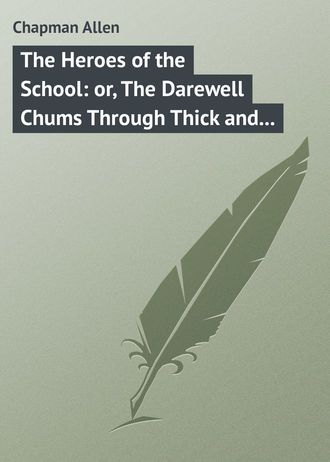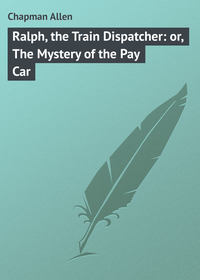 полная версия
полная версияThe Heroes of the School: or, The Darewell Chums Through Thick and Thin
Jim reached out until he could touch the tree branch with the toe of his shoe. Then he manipulated the little club until he could get his fingers on it, which took several minutes. Once it was in his hands he managed to reach the bait can and drew it toward him. All this while he was stretched out on his back.
Still in this position he baited his hook and then, without looking to see where it landed, he threw the weighted line in the direction of the river. The hook struck just on the edge of the bank on which Jim reclined, but he could not see this and thought it had dropped into the water. The chums looked on at this exhibition of laziness, though it was no new thing to them.
“Think you’ll catch anything, Jim?” asked Frank.
“Hope not, have to pull it in, and I’m tired,” responded the recumbent lad.
“Oh, we’ll do it for you,” said Bart.
“Um,” grunted Jim, that probably being his thanks.
The four comrades were munching their sandwiches, and once in a while Jim would turn his head and look at them. He was hungry but too lazy to ask for something to eat.
“Watch me,” whispered Ned to his companions, and then he prepared to tantalize Jim.
Ned took a piece of cake and tied it to a string. The cord he fastened to the end of his fishing pole and then, moving silently through the bushes, he took a position directly behind Jim, and some distance away.
Slowly Ned raised the pole with its dangling string and bit of cake until the latter was poised right over Jim’s head. Then he slowly lowered the dainty until it was within a few inches of Jim’s mouth.
“A new way to feed lazy folks,” observed Bart in a low tone.
The cake was held there a few minutes, but Jim seemed unaware of its presence. Ned could not understand it. Then Fenn looked over and saw that Jim was asleep.
“Can’t have the trick spoiled that way,” murmured Frank, and tossed a little pebble that hit Jim on the face. The lazy boy opened his eyes, and saw the choice bit of cake directly over his mouth. It was coming right down to him, after the manner in which cocoanuts, bananas and oranges are said to drop into the hands of the happy dwellers in tropical climes.
“Now for some fun,” whispered Fenn.
The cake was almost in Jim’s mouth. He opened his jaws. A happy look came over his face. He had his lips on the dainty, when, with a quick motion, Ned jerked it away.
Jim was so surprised he did not know what to do. The disgusted look on his face made the other boys burst into a roar of laughter. Jim raised himself on his elbow and looked at the conspirators.
“Um!” he ejaculated. He was too lazy to get mad. Then he went off in another doze.
Ned went back to join his companions, all of them still laughing at the joke.
“Let’s make him believe he’s caught something,” suggested Fenn. “Tie something to his line.”
“It’s your turn,” spoke Ned, and Fenn nodded assent.
He made his way quietly down the bank until he could pull Jim’s hook from the water which just touched it. He fastened something to it and then gave the line a sudden yank. Jim had the pole tied to his wrist to prevent a possible big fish from taking it away from him as he slept, and Fenn’s jerk awakened him.
“Got one,” announced Jim, not bothering to sit up straight. Then he began to pull in. The line came up with a suddenness that surprised him, as Fenn let go, and an old rubber boot, that Stumpy had attached, flew over and struck the lazy lad in the face.
“It’s a whopper!” he cried until he saw what it was. Then, with a disgusted look at the plotters he turned over and went to sleep again.
“What can you do with a fellow like that?” asked Ned appealing to his chums.
“Death will never overtake him,” replied Frank. “It will pass him on the road, thinking Jim has already passed in. He certainly is the last word in laziness.”
The four comrades decided they had enough fishing for the day, so, putting away their tackle and adding some fresh wet grass to the baskets of fish in order to keep them cool, they started for home.
“Let’s take the short cut,” suggested Frank. “Right through the woods.”
“Do you know it?” asked Ned. “I nearly got lost once, going that way.”
“I guess I can pick it out.”
So they began their tramp. But they had not gone more than a mile along the half-discernable path before Frank, who was in the lead, uttered an exclamation.
“See a snake?” asked Bart.
“No, but here’s a hut that I never noticed before,” was Frank’s answer. “I wonder if I am on the wrong path. It looks right but I never saw this shack.”
The boys gathered around him. On one side of the path, in a little clearing, half hidden among the trees, was a small log cabin. It looked as though it had always been there, but the boys were sure it must have been erected recently.
“There’s something painted over the door,” said Bart.
The boys looked. There, in brilliant red letters, were the words:
KING OF PAPRICA
CHAPTER V
THE CHALLENGE
“Well what do you think of that?” asked Ned. “Talk about queer coincidences, here’s one! Now if only the crazy man would appear we – ”
“Some one is coming,” exclaimed Frank, as a noise was heard near the hut.
The next instant a short stout man, with black hair and a blacker moustache, came around the corner of the hut. On his head he wore a little gilt crown.
“There’s the King of Paprica!” whispered Bart, but not so low as to prevent the man hearing him.
“At your service,” replied the man, with a bow.
For a few seconds the boys did not know whether to laugh or run. It was certainly a very strange affair, coupled with what the old man had said to them.
“Are you really – ” began Fenn, when the man held up a warning hand.
“Please don’t speak of it,” he said in a mild voice. “I am here for a certain purpose. Have you seen an old man in these woods? Rather a strange character.”
“Something like yourself,” said Ned, but in the faintest whisper.
“Yes, we did,” replied Frank, who seemed somewhat excited over the sight of the man with the gilt crown. “He said you would know he was on guard. He also – ”
“Yes, I know all about it,” was the quick answer. “It’s very unfortunate. I beg of you not to mention it to any one. I may rely upon you?”
“You may,” said Frank so earnestly that his chums wondered whether he knew more about the queer happenings than they did. “We will say nothing.”
“It will all come out right in the end,” went on the man with the crown. “Which way was he going?”
“He seemed headed in this direction,” replied Fenn.
“Then he will arrive in time for the audience,” said the King of Paprica. “I must bid you farewell now,” and with that he went into the hut and closed the door after him.
The boys stood for a few seconds gazing at the silent cabin with it’s odd inscription, and then Bart exclaimed:
“Come on! Let’s get out of here. First thing you know we’ll be getting crazy ourselves. This place isn’t safe!”
He hurried on through the woods and the others followed.
“What do you make of it?” asked Ned.
“Why, it’s plain enough,” spoke Frank. “The old man we met first is crazy, and this one is his keeper. He’s brought him out here into the woods to cure him, and he probably has to humor him by pretending to be a king. That’s all there is to it. I’ve often read of such cases.”
“Seems to me you’re fond of reading about lunatics,” said Bart.
“I am. I read all I can on such cases. It is very fascinating.”
“Excuse me,” broke in Ned. “I’d rather have something cheerful.”
“Oh, but you have no idea what strange fancies some of the unfortunates have,” said Frank earnestly. In his eyes there glowed a strange light, and his chums, looking at him, felt he had more than ever that queer air of mystery about him.
“Well, we’d better be moving faster than this or we’ll be held up again by the King of Paprica’s guard,” spoke Ned. “I think you’re wrong about it, Frank.”
“How do you mean?”
“I think both those chaps are crazy. It’s a puzzle to tell which one is worse.”
“I agree with you,” said Bart. “I wouldn’t want to meet either one of them here alone in the woods after dark.”
“Nonsense,” exclaimed Frank. “Why, a lunatic is the easiest person in the world to get along with. All you have to do is to humor him.”
“Let him kill you if he feels so disposed?” suggested Fenn.
“No, but if you should meet one, and he asks you to let him shoot you, fall in with his idea.”
“Hand him a gun, eh, Frank?” asked Bart.
“No, but, after he sees you are not going to oppose him, incidentally suggest that the moon is in the wrong quarter for a successful killing, or that the hour has not yet arrived, or that you have nine lives like a cat and that he had much better murder some one who has only one life. Ten chances to one he’ll agree with you and let you alone.”
“I guess that one chance would fall to me,” observed Fenn, “and I’ll give the lunatics a wide berth. You can have ’em all, Frank.”
“Well, I’ve read that’s the best way to act.”
“Oh, you and your reading!” exclaimed Ned. “Let’s talk about something cheerful.”
The boys hurried on through the woods. More than once they got off the path and had to spend some minutes finding it again, so they did not get home until nearly supper time.
“See you Monday,” called Frank to his chums, as he took the road that led to his uncle’s house.
“There’ll be a ball game next week, I guess,” came from Bart. “You may get a chance to play.”
“All right,” and Frank was off down the road.
“I’d like to see the inside of that hut,” observed Ned as he and the other two boys walked on.
“Still harping on that, eh?” asked Fenn. “I want to forget it.”
“Think we’d better mention anything about the queer men we saw?” asked Bart, as he and Fenn strolled through the shopping district, which was always a lively place on Saturday nights.
“Who to?”
“The police, of course.”
“I don’t see as it’s any of their affair. The men are harmless.”
“But they’re lunatics at large.”
“I guess it’s as Frank says, one is the other’s keeper. We’d better mind our own affairs. Besides Frank promised, for us, that we’d keep quiet.”
“Then I suppose we’d better. But maybe something will happen.”
“What, for instance?”
“They might murder some one.”
“Say, have you been reading any five-cent libraries lately?”
“No, but – ”
“Forget it,” counseled Fenn. “Ah, good evening,” he added, bowing to a pretty girl who passed them. “Excuse me, Bart. I want to speak to Jennie,” and Fenn left his chum.
“That’s the way,” growled Bart. “A fellow’s no good once he gets girls on the brain,” and he walked on alone, and quite disgusted with Stumpy.
“Oh, Fenn!” exclaimed Jennie Smith, as the boy joined her. “Isn’t it just like a play to see all the lights and the people hurrying back and forth? ‘All the world’s a stage and all the men and women merely players.’ I think that’s just grand! Oh I wish I could thrill large audiences!” she added, for her secret desire was to become an actress. “What is this I see before me! Is it a dagger, the handle – !”
But just then Jennie collided with a fat man in front of her. He turned, good-naturedly and remarked:
“No, young lady, I’m not a dagger, though I’d like to get thin enough to be taken for one.”
Jennie blushed, and Fenn was a little embarrassed. Soon after that Fenn bade Jennie goodnight.
Monday morning when the chums reached school there was a buzz of excitement among those gathered on the campus waiting for the nine o’clock gong to ring.
“Here they come now,” called some one. “We’ll see what they say.”
“What’s up?” asked Bart, as he saw the crowd of boys hurrying toward him and his chums.
“We’ve got a challenge!” exclaimed Lem Gordon, pitcher of the school nine, of which Bart was catcher.
“Who from?” asked Bart.
“The Lakeville Prep. school. It’s for Thursday. Dare we take ’em on?”
“We dare do all that may become our school,” paraphrased Frank. “Why not?” He did not play on the regular nine.
“They’re out of our class,” said Lem. “Haven’t lost a game this year, and they’re way ahead of us. Have better grounds and more time to practice.”
“Well, we don’t want to show the white feather,” said Fenn. “Maybe we’ll have a chance.”
“We sure will if Lem pitches as he did in the game two weeks ago,” spoke Bart. “That certainly won the game for us if anything did.”
“Your catching had a lot to do with it,” put in Lem, “and so did Ned’s fielding.”
“To say nothing of Stumpy’s work at short,” added Bart. “I say let’s give ’em a game. They can’t any more than wallop us!”
“Hurrah!” yelled the crowd of boys. “Three cheers for Bart!”
“Cut it out!” said Bart. “Think I’m a political candidate? We’ll go in with the idea of winning!”
CHAPTER VI
A GREAT GAME OF BALL
Word soon went around that Bart, who was captain of the nine, had decided to accept the challenge which had come to Harry Mathews as manager of the team. The challenge had only arrived that morning and there were few of the high school boys who believed their nine stood any chance of winning.
The Lakeville Preparatory School was a private institution located about three miles from Darewell. It was attended by youths who were fitted for college there, and the pupils were, on the average, older and larger than the Darewell High School lads. Their nine had an enviable reputation in local sporting circles.
The high school boys were so worked up over the prospect of the game, with rivals they had never yet ventured to play, that there was less attention to lessons than usual among the members of the nine, and their supporters, that morning.
Fenn must have been thinking quite seriously of the pending contest for, when answering in the ancient history class the question: “Who was Cæsar’s greatest rival?” he replied solemnly:
“The Lakeville Prep. School!”
There was a burst of laughter in which even the instructor had to join.
“We’ll have to practice for the next three days,” said Bart at noon recess. “I’ll have to get my new glove limbered up, and, Lem, you’ll have to think up some new curves.”
“Yes, I need practice all right,” responded the pitcher. “Suppose we have a scrub game this afternoon?”
“That suits me,” replied Bart.
When school was over a picked nine prepared to give battle to the regular one in order to bring out the weak points.
“Don’t you think we ought to have a substitute pitcher?” asked Lem, as he prepared to go into the box.
“You aren’t afraid of breaking down, are you?” asked Bart anxiously.
“No, only you never can tell what is going to happen.”
“Here you go, Stumpy!” called Bart as his chum was tossing the ball to the right-fielder in the warming-up practice.
Fenn sent the leather spheroid toward the catcher with all the strength of his arm. Bart caught it on his heavy glove. As he did so he called in a low voice to Lem, and the two held a whispered conversation.
“Do you think he can do it?” Lem asked.
“Yes, if we spring it on him suddenly and don’t give him a chance to get nervous. That’s Stumpy’s main fault. But I’m hoping there’ll be no need for it.”
“Well, I’ll do my best,” responded Lem.
The practice game was started, and several weak points developed in the regular high school nine. But Bart was not discouraged. There had been little opportunity for games, of late, and the boys were a trifle slow. He coached them along, suggesting improvements and offering words of advice to some players.
“Good!” cried the captain to Frank, who made a brilliant catch in center field. Frank was playing on the scrub nine. “You’ll be a regular if you keep on.”
Frank was not a natural baseball player. His forte was football, but once in a while he made brilliant plays on the nine, when he took some other player’s place.
“A couple of days more like this and we’ll be fit to give ’em all they want, to beat us,” remarked Bart as the boys gathered up the balls, bats and gloves preparatory to going home.
“If we only could beat ’em!” exclaimed Ned.
“If we hold ’em to a tie I’ll be satisfied,” retorted Bart. “That’s something no high school nine has ever done to ’em.”
For the next two afternoons there was hard practice. On one occasion Bart called on Stumpy to take the pitcher’s box, Lem making an excuse that he wanted to rest his arm. Stumpy wondered at this, as Sandy Merton was the one who usually substituted for Lem. But this time Sandy was left on third, his regular position.
Fenn had no idea he could pitch. He knew he could send in a straight ball, and he did this in practice. When Lem came back in the box on one occasion after Stumpy had been filling it, he asked in a low tone of Bart:
“Will he do?”
“I think so, but don’t say anything.”
The morning of the game the Darewell nine assembled before school, on the campus and indulged in some fast practice. The contest was to take place on the Preparatory school grounds, and in answer to a general petition Professor McCloud agreed to dismiss all classes an hour earlier that day to enable the journey to be made.
The nine and the substitutes went over in a big stage but the boys and girls who were to be spectators took trolley cars that ran close to the grounds.
“They’re a husky looking lot,” observed Bart as the stage dropped its load close to the diamond, and he observed the other nine on the field. “They play fast, snappy ball, and we’ve got our work cut out for us.”
The Darewell team soon got into practice, their methods being closely watched by their rivals. Captain Benson, of the other club, greeted Bart, and the preliminaries were soon arranged.
“Play ball!” called the umpire, and the game was on.
The visitors had won the toss for innings, and in consequence Lem had to open the struggle. The first ball he pitched went wild, and the next one struck the batter, giving him his base.
“Rotten!” whispered Lem to himself, disgustedly.
“Take it easy,” advised Bart, walking out to the pitcher’s box. “Keep cool.”
The advice did Lem good, and he struck out the next two men. Then they began to find his curves and he was hit for two single baggers and one three. At the end of the inning the game stood three runs in favor of the Preparatory school.
It was Bart’s first turn at the bat, and he managed to get to first on balls. Then Ned lined out a nice two bagger, and Fenn planted one over in right field that enabled Bart and Ned to get in. The inning ended three to two in favor of the home team.
For the next four innings neither side scored. It was a pitchers’ battle and Lem was doing fine work. But, on the other hand few of the Darewell boys could find the curves of the Preparatory school’s pitcher.
The next inning the home team got in three more runs and the visitors two, making the score four to six, against the high school boys.
“We’ve got to do better than this,” said Bart, as his team came to the bat for the eighth inning which had netted the Preparatory team one run, making their total seven.
The high school team seemed to “take a brace,” for they made three runs by hard work.
“That ties ’em!” cried Bart excitedly, as he came to the bat. “Now to beat ’em.”
As he spoke there was some sort of a commotion near the bench where the Darewell players were sitting. Then came a cry:
“Ouch! My wrist! Let up, Sandy!”
“What’s the matter?” asked the captain, running over to where he saw a struggle.
“Oh, Sandy Merton tried to play a trick on Lem,” explained Ned. “He’s always up to some foolishness.”
“I was only showing a new wrestling hold,” said Sandy. “My foot slipped and I fell on him.”
“Are you hurt, Lem?” asked the captain.
“Wrist sprained, I guess,” and he extended his hand which was beginning to swell.
“That settles your pitching,” remarked Bart. “Pity you aren’t left handed. Well, it’s a good thing we provided for an emergency. Sandy, you ought to have better sense,” and he spoke sternly.
“Oh, if you’re going to act that way about it I’ll not play,” and Sandy started away.
“Suit yourself,” said Bart calmly. “Frank, you take third in Sandy’s place.”
“Who’ll pitch?” asked Ned.
“I’ll decide when the inning’s over,” replied Bart, as he went back to the bat.
Probably the little scene made Bart nervous, for he struck out, an unusual thing with him. That put the side out, the inning ending in the tie score. There was little apprehension in the ranks of the Preparatory team, but there were anxious hearts among the high school supporters. The cheering died away.
“Stumpy; you pitch,” called Bart.
“Me! Why I can’t pitch! I never pitched a regular game.”
“I’m captain, and you pitch,” said Bart decidedly, and much amazed at his selection Stumpy walked into the box.
The suddenness of it was just his salvation. He had no chance to get nervous.
“Can he do it?” asked Ned, as he started for his place.
“He’s got a fine, natural curve,” replied Bart. “I never noticed it until the other day. Discovered it by accident. I think he’ll make good.”
And Stumpy did. He hardly knew how he did it, but he had a knack of throwing the ball that fooled the best batters on the other team. He struck out the first two men, and there arose murmurs of anxiety among the rivals.
“Why didn’t they put him in first?” asked the captain of the home team of some of his men, wondering why so good a pitcher had been left to the last.
The third batter managed to plant the leather in a long flight in the direction of third base. But Frank was right on the alert. He made a splendid jump and caught it, putting the side out minus a run. There was a wild burst of cheering from the high school girls and boys.
“Only takes one run to beat ’em!” exclaimed Bart as his team went to the bat for the last time. “Somebody get it!”
Somebody did. It was Ned, who came first to the plate. He lined a beauty just over the center fielder’s head, and got two bases on it. Joe Wright brought him in, and such a yell as went up from the high school crowd was seldom heard on that diamond.
“That does it!” yelled Bart, capering about. “Stumpy! you’re all to the good!”
“But Ned won the game,” objected Fenn.
“Your pitching held them down just when they would have walked away from us. You’re all to the good, Stumpy!”
“Three cheers for Stumpy!” called some one, and they came with a vim that made Fenn blush.
CHAPTER VII
ALICE HAS A CHANCE
The four chums were certainly regarded as the heroes of the school that day, for they had been instrumental in winning a victory that went down in the history of the institution as a most brilliant one.
“I didn’t know you had it in you, Stumpy,” said Ned, as the nine reached the high school grounds on the return trip.
“Me either,” replied Fenn. “It sort of ‘growed,’ like Topsy in Uncle Tom’s Cabin.”
“To think of beating the Preps,” murmured Bart. “It’s the finest thing that ever happened.”
“How’s your wrist, Lem?” asked Frank.
“Hurts like the mischief. Sandy came down on it with all his force.”
“Say, I wonder if he meant that?” asked Fenn.
“Meant it? What do you mean?” asked Bart.
“Well it looked queer,” went on Fenn. “There we were in a tie game and we needed every advantage we could get to hold it. Then Sandy gets up to one of his tricks, and he might have known something would happen. It always does when he tries his funny work.”
“You don’t mean to say you think he deliberately hurt me, do you?” asked Lem, winding his handkerchief around the swollen wrist.
“Well, I wouldn’t want to accuse any one unjustly,” Stumpy continued. “But I heard he was going around saying things about being done out of his place as substitute pitcher, in practice, by me. Maybe he thought he’d just hurt Lem a little so’s he could have a chance to finish out the game.”
“I’d hate to believe it of him,” remarked the captain, “but he certainly did act rather strange. He went off angry, too. Well, it can’t be helped. Guess we’d better not say anything about it unless he tries to do something else. Come on to the drug store, Lem, and we’ll get some arnica for that wrist.”
Most of the boys dispersed at the school campus where the stage had left them, but the four chums, with Lem in their midst, walked up the street together.









